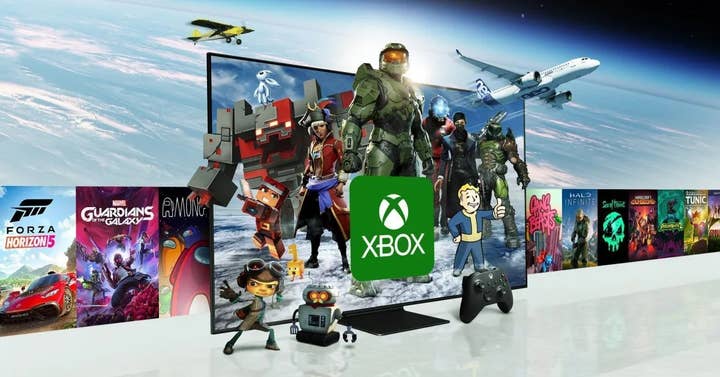Is Game Pass’ dominance a hurdle to the Activision acquisition? | Opinion
The UK’s competition authority suggests that subscription services are legally a separate market from game consoles; if that idea holds water, it could spell trouble for Microsoft
When you’re talking about a deal as big as Microsoft’s acquisition of Activision Blizzard King, the eye-grabbing initial announcement – with its almost $70 billion price tag making every previous games industry merger look like peanuts by comparison – is only the beginning.
For a smaller deal, the story a few months later that the merger has completed is basically a formality; the deal is in the bag once the parties get to the point of announcing their corporate nuptials to the world.
With this much money, and some of the world’s most successful entertainment franchises, on the table, however, the Microsoft-ABK deal was always going to attract scrutiny from competition authorities – and this week, the UK’s Competition and Markets Authority made the road a little bumpier for both parties, with a report into the deal that’s distinctly negative about its impacts on competition in the games space.
It was always likely that the most critical scrutiny of the deal would come from that side of the Atlantic, with both the CMA and the EU’s competition authorities being generally more suspicious of monopolistic behaviour, or the prospects of future monopolistic behaviour, in tech markets.
Cynics might point out that the EU and UK would probably be a lot less critical of tech giants if any of those giant companies came from Europe, as it’s politically much easier to take a hard line on regulating companies based in another country. The cynics have a point, but it’s a moot one; as tech companies going back as far as Microsoft in the 1990s have found, European competition authorities are tough opponents who can place major restrictions on their actions.
As Christopher Dring points out in his piece on the CMA’s report about the Microsoft-ABK deal, the UK’s CMA has turned out to be a particularly unpredictable wildcard in the post-Brexit world. Though it’s historically been seen as a fairly light-touch regulator – reflecting to some extent what’s generally been a very pro-business climate within successive UK governments in recent decades – some recent decisions have suggested a willingness to challenge the world’s biggest companies, and to think outside the box about the consequences of acquisitions and mergers in a way that makes some corporations nervous (or at the very least, extremely irritated).
The tight focus on Call of Duty is questionable, as it ignores the potential impact of Microsoft becoming the owner of Blizzard and King properties to focus entirely on one side of the Activision busines
That outside-the-box thinking is on display once more in the Microsoft-ABK report. The report is by no means watertight in its reasoning or conclusions – the incredibly tight focus on Call of Duty to the exclusion of many other aspects of the deal is questionable to begin with, as it effectively ignores the potential impact of Microsoft becoming the owner of Blizzard and King properties to focus entirely on one side of the Activision business.
However, the creative way in which the CMA constructs its reasoning around the impact of Call of Duty being acquired by Microsoft is very interesting in its own right – and, if it becomes more widely accepted by regulators in the UK and elsewhere, could become very troublesome both for this deal and for other industry deals down the line.
In its justification for the ABK deal, Microsoft rightly presents itself as an underdog in the console market, lagging behind both Sony and Nintendo in terms of active installed base – a position that’s easy to establish simply from looking at sales figures. This argument is reiterated in the company’s responses to the CMA’s comments.
How, Microsoft argues, can a company which is in third place behind two very strong rivals in a highly competitive marketplace, both of whom have stronger line-ups of exclusive titles and intellectual property, be seen as potentially suppressing competition to a harmful degree with an acquisition such as this?
A dominant platform holder buying a major third-party publisher should certainly raise eyebrows with competition authorities – that would absolutely damage the prospects of existing rivals and discourage potential new entrants to the market, both of which would ultimately be harmful to consumers. But for a third-place player, even one with Microsoft’s billions behind it, to try to catch up with its more successful rivals with a strategic acquisition is, well, precisely what strategic acquisitions are for.
The CMA, however, is not concerned so much with the market position of Xbox consoles relative to PlayStation or Switch consoles – but rather with the market position of Game Pass. Its reasoning is, in essence, that game subscription services are platforms in and of themselves, not simply extensions of a console platform – and in the contest of game subscription services, Microsoft’s Game Pass is the very clear market leader.

The CMA’s concerns, therefore, are less about the impact of Call of Duty being exclusive to Xbox platforms and withdrawn from PlayStation or Switch, and more about the prospect of Call of Duty being exclusive to Game Pass, and unavailable to any other subscription service, a concern it treats as largely separate from the question of console exclusivity.
That’s an unusual approach to take, but certainly an interesting one – and as game subscription services become increasingly platform-agnostic, it might actually be the most reasonable way to think about this side of the business.
Certainly, Game Pass will always have some connection to Xbox, even though it’s already a PC service too, and will undoubtedly branch out even further, while Sony’s various PS Plus tiers will always be tied to PlayStation to some degree – but the introduction of streaming services, along with other market changes like Sony’s accelerating move into PC game publishing, will likely create a business environment where many players face a choice of subscription services in direct competition with one another, rather than simply having a subscription service that’s clearly tied to their chosen hardware platform.
To some extent, the CMA is applying similar logic here to the way it thought about the acquisition of Giphy by Meta – an acquisition which it ultimately ruled to block, in fact ordering Meta to divest itself of Giphy, since the deal had already gone through. In that argument, the most substantive aspects of which were upheld on a court appeal, the CMA relied on thinking about “dynamic markets” – talking not just about existing competition in the market, or expected future product launches from competitors, but about the potential for competition and innovation to emerge dynamically within a marketplace.
Meta didn’t like that line of argument one bit – not least since it gave the CMA grounds to rule on the basis of hypothetical future competition between Giphy and Facebook’s advertising businesses in the UK, despite Giphy not actually having an advertising business in the UK at the time of the acquisition, which Meta argued meant that there was no business nexus in the UK and thus no reason for the CMA to be involved in the first place – but the courts seemed satisfied that the reasoning was sound, especially when dealing with markets where major technological change is driving large shifts in competition over short periods of time.
The CMA’s concerns are less about the impact of Call of Duty being exclusive to Xbox platforms and withdrawn from PlayStation or Switch, and more about the prospect of Call of Duty being exclusive to Game Pass
That certainly sounds like a fair description of the game subscription market; if we’re to consider that to be a market separate from the console market (and this tricky question of how exactly you define a market is often central to competition authority decisions), then it’s definitely one that’s undergoing very rapid change and innovation. If not just the CMA but regulators in other markets take that logic on board, it could cause significant problems for any future large mergers in the industry.
With Game Pass, Microsoft is building a dominant position in game subscription services that it never held in console hardware, even in the halcyon days of the Xbox 360, and while the reasons for that are perfectly clear – Game Pass is a fantastic offering that’s far ahead of anything any other company is doing in the subscription space – that won’t stop authorities from taking a dim view of efforts that can be interpreted as Microsoft throwing around the weight of its warchest billions to establish an unassailable moat around the Game Pass business and quash any potential competition before it can get a foothold.
Microsoft’s counter-argument that a single game franchise becoming a platform exclusive couldn’t possibly have such a severe impact on a market leader like Sony is relatively solid, even if there are certainly historical examples of times when key game franchises have been make-or-break for a console platform. I’m not convinced that Call of Duty is actually one of those franchises, despite its enduring popularity.
However, if we look at game subscription services as a market in themselves, things look very different. Game Pass is far ahead of any competitors, and making Call of Duty (a multiplayer title with a huge network effect) into a Game Pass exclusive title would go a long way towards locking out competition not only from Sony, but also from any other prospective game subscription or streaming service.
Things aren’t quite as simple here as some of the CMA’s reasoning seems to imply – the platform holders’ subscription services are still locked to their own consoles to a greater or lesser degree, after all, so there’s significant friction in place and it’s not like PlayStation owners will be flocking to Game Pass en masse. But the authority’s view on where the subscription market is headed is sound, as it’s eminently likely that game subscription services will be directly competing for the same consumers in many areas in future.
It remains, I suspect, fairly unlikely that the CMA will actually attempt to block the deal entirely; it’s worth noting that it’s operating under a government whose mood music at the moment (aside from a constant sense of panicked lurching from crisis to crisis) is very much "bonfire of the regulations," and the excessive focus on the Call of Duty franchise in the report is a major weakness in the reasoning, not least since Call of Duty, for all its popularity, isn’t even remotely close to being in a dominant or monopoly position among online shooting/action games.
Winning some further concessions from Microsoft regarding Call of Duty’s exclusivity status is a more likely outcome than a block to the deal overall. However, the rationale the CMA has introduced here could have a far-reaching impact on Microsoft and other major games companies even if the ABK deal does go through – as regulators may start to see Game Pass’ dominance as a potential monopoly scenario, especially if the CMA’s concerns turn out to be well-founded and Call of Duty exclusivity harms the competitiveness of the sector.
That’s a situation Microsoft has painful experience of, and it often goes out of its way to avoid any accusation of monopolistic practices in its various businesses, even to the extent of occasionally directly propping up competitors to ensure that its products and services do not become too dominant.
As long as Game Pass is being seen as an adjunct to the Xbox business, the notion of it being too dominant or monopolistic was never really a concern; but if game subscriptions are going to be treated instead as a business sector in their own right, Microsoft may need to re-evaluate some of the moves it’s planning to ensure Game Pass’ market dominance.

